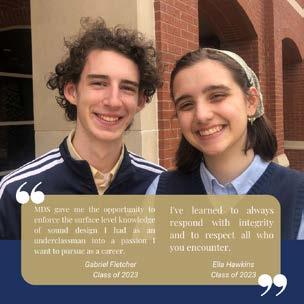
3 minute read
Empowering Excellence: A Comprehensive School Evaluation and Self-Study
It is important for independent schools to receive accreditation from organizations such as Cognia, that provide a thorough review of the educational program by academic peers. When colleges and universities review student applications during their admissions process, accreditation affirms that the academic program meets the highest standards. Every five years, MDS goes through a self-study and goal setting process to renew our accreditation.
Mount de Sales’ self-study and peer review began on August 6, 2019, with a unique approach Administration’s goal, above all, was to hear first-hand accounts from every student on how to improve the school experience, and every student was interviewed personally by a faculty member. With this one-on-one strategy and results analyzed by faculty committees, the school determined there are two improvement goals to pursue and implement over the next five years:
1) To create an intentional program to build independent learners, with suggested competencies at every grade level.
2) To expand and improve transitions between divisions and grade levels, with special attention to students entering MDS for the first time.
A third improvement goal emerged from the Steering Committee within its final year. To continue the process of curriculum revision and alignment, with a specific focus on improving communication between divisions and grade levels.
There are many methods our faculty use to implement independent learning techniques over the course of a Cavalier’s academic career. For example, English teacher, Eileen Carlson, works with eleventh grade students in both grade-level and AP classes and identifies a key skill which gradually shifts the process of creating study aides from teacher to student. “In English classes at Mount de Sales, students practice annotating their texts as they read, a skill and habit which enables them to focus their attention while reading and to create effective study notes for later review,” noted Mrs. Carlson “As they read more and more complex and lengthy texts, this skill will allow them to be more independent readers.”
Melanie Bentley, middle school science and STEM teacher, provided several examples of how she teaches independent learning skills in the classroom in tandem with her lessons. Melanie said, “At the start of the year when the eighth graders receive their ipads, I work with them for several days on practical applications we use in class like Notability, a note taking app that allows students to separate notes by subject and stay organized.” During one of Melanie’s classes, students learned about atomic theory and built a timeline with index cards to practice this important study skill. “We are intentional when identifying and incorporating skills like these into everyday lessons to prepare students for upper school,” said Mrs. Bentley.
Academic cohorts were introduced during the 2021-2022 school year as a strategy to improve transitions between divisions and grade levels. These faculty groups were matched by discipline with the sole purpose to develop a seamless curriculum and prepare students for the next grade level. Laura Heacox, who serves as the math cohort lead and teaches eighth and ninth grade math classes shared, “My role involves organizing meetings focused on curriculum and ensuring seamless transitions between math courses. The middle and upper school head designate what
The middle and upper school head designate what needs to be accomplished for these meetings to develop a seamless curriculum that avoids repetition and prevents learning gaps,” said Laura Heacox. “When we initially reviewed the coursework together, we asked ourselves, ‘is this reflective of what we’re currently teaching?’ and I’m happy to say we didn’t identify any major gaps in the curriculum.” Teachers also used this time to share experiences with specific teaching strategies and tools.
“It’s helpful for different grade level teachers to know the expectations set in each other’s classes because it helps tailor their teaching methods to ready students for the next course level,” said Mrs. Heacox.
Mark McMahon, upper school physics teacher, organizes peer volunteers to help with the academic and social development of students entering upper school.
“We offer through National Honor Society (NHS) a mentor/mentee program where all the freshmen are paired off with a member of NHS during orientation,” noted Mark. “They have organized activities once every quarter to strengthen relationships with their peers.”
When it comes to easing transitions academically, Mr. McMahon cites the collaborative approach taken with course selection for his honors physics class as an example, “Any of our students are welcome to take honor physics as an exploratory class. However, the primary focus of the course is to prepare students for AP Physics. So when students enroll in the course, I’ll work with Mrs. Heacox to check the math background first so we know what concepts students are familiar with. We work with some advanced math concepts in honors physics so it’s important to have a strong foundation in math to succeed in the course.”
A visiting accreditation team with Cognia met with faculty and staff in November to review the school improvement goals and make recommendations for implementation. Over the next several years, faculty will work collaboratively to improve the student experience. Above all, Mount de Sales Academy fosters a supportive and engaging learning environment for every student.





